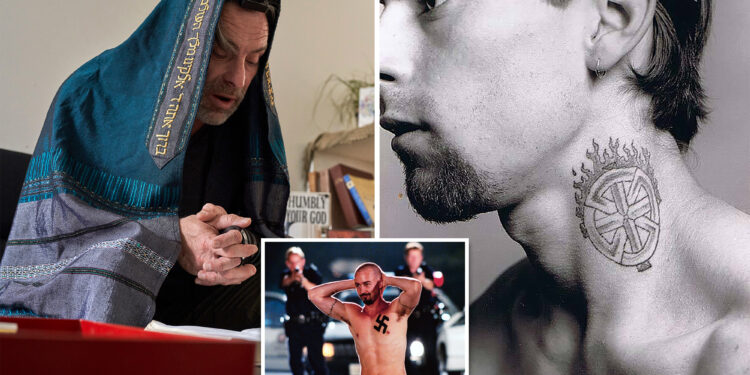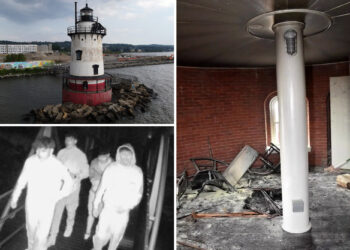
The neo-Nazi who inspired Edward Norton’s skinhead character in “American History X” has revealed he is now an observant Jew after turning his life around — and discovering his heritage through DNA testing.
Frank Meeink, 48, became a leader of a violent ultra-right group in the early 1990s, torturing enemies who stood in the way of his attempt to foment a race war.
Intensely anti-semitic and flaunting a flaming swastika tattooed on his neck, he railed against what he called the “Zionist occupation government” and believed the Jews were “the root of all evil.”
In 1998’s “American History X,” Norton’s Derek Vinyard character was based, in part, on Meeink’s road to redemption as he began to ditch his racist views after kindling friendships with black inmates in prison.
But now Meeink has revealed to The Post an astonishing twist: he is Jewish.
Long after quitting neo-Nazism and attempting to make amends for his past, he took a 23andMe test and discovered that he has Jewish ancestry — and has now embraced his heritage.
He was prompted to take the test by a chance remark from a friend that he “looked Jewish.” “I just wanted to see if it was true, I wanted to see if it was real,” Meeink said.
“I found out by a beautiful gift from God that I was Jewish through DNA.”
The test showed his ancestry composition is 2.4% Ashkenazi Jewish. The small proportion belied its importance: his mother’s maternal great, great grandmother Elizabeth Zellman Rementer was Jewish — meaning that, according to the tradition of matrilineal descent, he is too.
Although not all Jewish scholars would accept that definition, many do — and Meeink has enthusiastically embraced Judaism.
He prays three times daily wearing the tallit and tefillin of observant Jews, attends synagogue, goes to three Torah study classes a week and keeps kosher.
Meeink grew up in an Irish-Catholic enclave in southwest Philadelphia with his mother and abusive step-father, surrounded by black families.
Escaping his fractured home life at his aunt and uncle’s farm near Lancaster, PA, in the summer of 1988, the 13-year-old was greeted by his neo-Nazi cousin who had a mural of Hitler in his bedroom.
Meeink feared drugs and black people, and his cousin’s skinhead crew “justified all my fears,” he said.
After returning home, he travelled the US, meeting prominent neo-Nazis including David Duke.
“I grabbed onto this information that was being fed to me,” he said. “I wanted to make this movement bigger.”
Aged 15, he had already joined – and been booted from – the Ku Klux Klan before deciding to form his own group with his cousin, called Strikeforce.
Meeink used the Bible to preach hate, “just like Hamas does with the Koran” and started his own public-access cable TV show in Springfield, Illinois, called “The Reich” full of racist “skits and jokes.”
Strikeforce particularly despised the anti-facist Skinheads Against Racial Prejudice (Sharp).
Meeink, who had “Sharp Killer” tattooed inside his lower lip, invited a member of the group to a party on Christmas Eve, 1992, then held him captive and tortured him.
“So we kidnapped him, used firearms — we had guns and s–t. We had him stay in the apartment and tortured him for hours with no remorse, no empathy, no nothing,” he recalled.
Aged 17, Meeink was sentenced to three years for aggravated kidnapping. In the custody of the Illinois Department of Corrections he quickly became part of a crew of Aryan “farm boys and bikers.”
But unexpectedly, he bonded with two black inmates nicknamed Jello and G over games of football and cards in the prison yard, and began a slow journey out of neo-Nazism, which helped inspire Norton’s character.
He got out of prison in just over a year and still went to neo-Nazi rallies where he scoffed at their racism towards black people — but not their anti-semitism.
“I would hear them say all black people are this way,” he said, thinking “That’s not true.” But his anti-semitism meant, “I’m still gonna preach against the Jews.”
In 1994, jobless and a drunk at just 19, he was offered work in an antiques store in Cherry Hill, New Jersey, by its owner, Keith Brookstein, even though Brookstein was Jewish.
“‘Did you tell him about me — the swastika?’,” Meeink said he tentatively asked his friend who got him the job.
“Keith doesn’t give a rat’s a-s what you believe, just don’t break his furniture,” he replied.
Brookstein’s kindness, compassion and willingness to forgive resonated deeply with Meeink.
Eventually while on a walk, he thought about his anti-semitism, “Who are you to judge the world, you’re a f—ing criminal, a drunk. “That was the day I was like, ‘I’m done. I’m out.’”
The next morning, for the first time in years, Meeink didn’t shave his head. He later had the swastika tattoo, and the word “skinhead” on his knuckles, removed.
Meeink has turned into an active campaigner against neo-Nazism but it is his embrace of Judaism which he said has meant the most to him.
He credits his faith with helping him in the wake of the darkest period of his life.
In 2019, Meeink went into recovery in Los Angeles, California for alcohol and drug abuse after the loss of his 19-year-old son Josh, the death of his mother Thomasine to a fentanyl overdose and the breakdown of his marriage, all in the space of five years.
There, he met his sponsor, a Jewish man he nicknamed his “recovery rabbi” who helped him find his faith and sobriety. “It was a lot of work,” Meeink recalled.
“In recovery it says, ‘Find the God of your understanding.’ And that’s when I was like, ‘I’m really going to check into this.
“The thing I loved about Judaism is that it says, ‘Love the Lord your God.’ And that you don’t need to force your God on nobody else. I wanna try and build this relationship with God.”
Meeink said his faith granted him humbleness and humility that enabled him to stand up for others.
He added: “On my morning prayer walk I keep saying the word stay. S-T-A-Y: stop thinking about yourself.”
He also continues to call his “recovery rabbi” every morning at 8am. “I only do these things, not to just seem like a part of the Jews,” he explained.
“I do it because it keeps God at the forefront of my mind. It’s His world, not mine.”
In 2020 he testified to Congress about neo-Nazis’ attempts to infiltrate police forces.
He is now hoping to turn the full story of his life into a movie which would be a sequel of a kind to “American History X” and is in talks with director Sam French, who was Oscar-nominated for the short film “Buzkashi Boys” in 2013.
It will have a simple message at its core: “Love is more powerful than hate.”



























